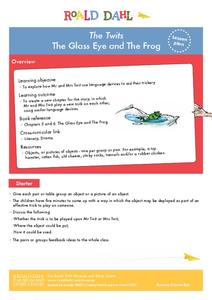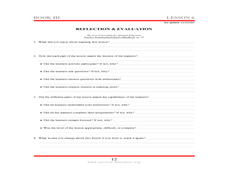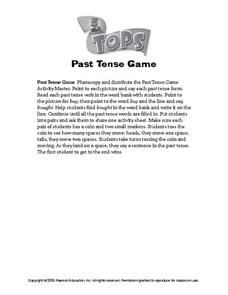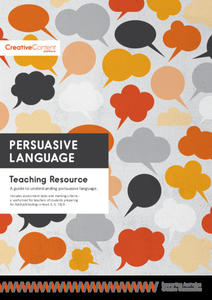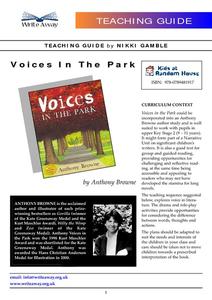One Stop English
A Lesson on Register
The classroom might not be the best place for informal language, but it's a great place to teach middle and high schoolers how to identify the correct language register for their audience. A short lesson on formal and informal language...
EngageNY
Analyzing Images and Language: Inferring about the Natural Disaster in Eight Days
Pictures often reveal different meanings. Scholars analyze the images in Eight Days and discuss how they add meaning to the text. Readers answers questions about how specific colors are used to create different emotions. Learners then...
Museum of Disability
Can You Hear a Rainbow?
Teach your class about compassion and empathy with Jamee Riggio Heelan's Can You Hear a Rainbow? As kids read about Chris, a boy who is deaf, they discuss the things he likes to do, as well as the ways he communicates with the world.
Curated OER
Charles Darwin Meets John Paul II
If you teach AP English language and composition and are looking for a way to address the differences between written and spoken arguments, consider this lesson. Over the course of three days, class members research Charles Darwin or...
Roald Dahl
The Twits - The Glass Eye and the Frog
What do a pair of stinky socks and a toy hamster have in common? The third lesson in an 11-part unit designed to accompany The Twits by Roald Dahl uses silly objects to teach about figurative language. Zany pranks and role play make for...
August House
Anansi and the Pot of Beans
Anansi is a tricky character, but can he realize he's wrong and write an apology letter? Learners use Anansi and the Pot of Beans to practice writing, art, and figurative language. A series of activities are engaging for both advanced...
Geography 360°
Poetry Writing
Put the tips and tricks in this guide into practice in order to encourage your pupils to blossom into poets. A wonderful reference material for teachers, this packet includes definitions of poetic terms and forms as well as step-by-step...
Digital Public Library of America
Teaching Guide: Exploring To Kill a Mockingbird
Harper Lee's To Kill a Mockingbird, considered by many to be a seminal piece of American literature, contains many complex literary themes that carry through United States history. Use a series of discussion questions and classroom...
Curated OER
How to Explore Religious Teachings Without Prejudice
Setting goals plays a major role in becoming a self motivated learner. Students will read and discuss a story, set personal goals, and analyze a sacred prayer. This lesson includes: teacher evaluation, goal worksheet, prayers, story, and...
Curated OER
Collective Poetry: Teaching Tolerance
Help your class create collective poetry following a simple, engaging model from Teaching Tolerance (tolerance.org). Each young poet writes five things on an index card: sayings from others, favorite sound, favorite place, favorite...
Pearson
Past Tense Game
Teach and taught, learn and learned! Work with your class on the past tense with some guided practice and a game. As a class, match the present tense verbs with their past tense counterparts. Learners then split off into pairs to play...
Museum of Disability
A Picture Book of Helen Keller
Teach your class about Helen Keller and her accomplishments with a reading comprehension lesson based on A Picture Book of Helen Keller by David A. Adler. As individuals read, they answer discussion questions about Helen Keller and the...
Creative Content Australia
Persuasive Language
Language has power. Use the materials in a language arts teaching guide to equip learners with the knowledge of the persuasive techniques, both verbal and visual, that can be used to influence thinking.
Curated OER
Teaching Science to English Language Learners
Use these hands on lesson plans to make science more accessible for English Language Learners in your classroom.
Curated OER
Teaching the Written Word to Those Whose Words are Limited
Get your learners' pens moving by emptying their thoughts onto the page.
Curated OER
The Great Eight: Teaching the Eight Parts of Speech
Integrate grammar activities and review into your daily classroom routine to facilitate practice and reinforcement of this vital skill.
Curated OER
Two Greedy Bears
Improving listening comprehension skills is the goal of this language arts instructional activity. Young readers listen to the story Two Greedy Bears, stopping to have discussions with a partner. They predict outcomes and make inferences...
Curated OER
Test Yourself: English Grammar
Start your day with a quick warm up. Have your class identify the correctly punctuated sentence as a quick, informal assessment.
Curated OER
English/Language Arts Methods Project
Students design a webquest requiring higher order thinking and providing students with opportunities to reflect on their learning. They include an assessment tool to evaluate the process and product.
Hood River County School District
Text Structure: Features and Organization
Teach learners how to interact with both fiction and non-fiction text with a packet of activities and worksheets. After looking over text structure and the difference in text features between different types of writing, readers analyze...
Write Away!
Voices In the Park
Explore the impact a narrator's point of view has on a story with a reading of the children's book, Voices in the Park by Anthony Browne. Written in four different voices, the story is told and retold from different perspectives to...
Curated OER
Cross-Cultural Dialogue Lesson
Students read and analyze a personal narrative written about a Peace Corps Volunteer teaching English in Guinea-Bissau, Africa. They discuss the concept of crossing cultures, analyze maps, complete worksheets, and develop a writing...
BBC
The Sound Monster - Words That Make Sounds
There are words in the English language that actually make sounds, such as vroom, and, buzz. Here is a clever lesson which introduces young readers to these sound-making words. They play an interactive game on the computer that has them...
Scholastic
What’s the Good Word? Etymology Project Guidelines
Who named the shapes, or the days of the week? Should words be removed from the dictionary if they're no longer commonly used? Are there too many words in the English language? Language arts students explore these and additional...






